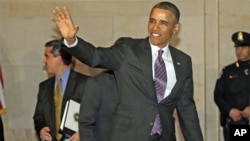CAPITOL HILL —
President Barack Obama’s third trip to Capitol Hill this week may have boosted his working relationship with lawmakers, but yielded no immediate breakthroughs on a bipartisan path to deficit reduction and improved U.S. fiscal health.
A smiling but tight-lipped President Obama emerged from a 90-minute closed-door meeting with Republican senators.
“It was a great conversation. It is great to be back in the Senate," said President Obama.
Republicans, like Senator Lamar Alexander, praised Obama’s willingness to meet with them face-to-face.
“Relationships are important," said Alexander. "When President [Lyndon] Johnson and [former] Republican leader Everett Dirksen had a good, close relationship, out of it came a civil rights bill in 1968. So relationships are important - that is step one. Step two is leadership. And in our system of government, if anything big is going to happen in a crisis, the president is going to have to lead. And that was the main message we suggested to him.”
For Republicans, “presidential leadership” means they want Obama to convince Democratic lawmakers to embrace cuts and reforms to government programs as a primary deficit reduction tool.
But Democrats, including Obama, want a mix of spending reductions and new tax revenue to improve America’s finances while also setting aside funds for domestic priorities like education and infrastructure. That approach is contained in a budget proposal unveiled by Democratic Senator Patty Murray earlier this week.
“This is a jobs and economic growth budget," said Murray. "We believe that, with an unemployment rate that remains stubbornly high and a middle class that has seen their wages stagnate for too long, we cannot afford any threats to our fragile recovery.”
The Senate’s top Republican, Mitch McConnell, labeled the Murray budget a “left-wing manifesto.”
“At a time when Americans believe about half of every dollar they send to Washington [in taxes] is wasted, the Democratic budget would increase spending by nearly 62 percent," said McConnell.
Democrats are similarly dismissive of a House Republican budget proposal with a cuts-only approach to deficit reduction.
Senator Charles Schumer:
“The truth is, Congressman Ryan’s fiscal plan relies on a lot of budgetary sleight-of-hand [tricks] in order to create the illusion of a balanced budget," said Schumer. "The document is filled with deceptive gimmicks, far-fetched assumptions, and phony arithmetic.”
With hardened partisanship and harsh rhetoric the norm on Capitol Hill, some might question whether any amount of presidential engagement with lawmakers will yield a compromise budget deal. But Republican Senator John Hoeven says Obama’s efforts, if sustained, will not go to waste.
“I specifically asked him [Obama] if he would stay involved directly, working with us, working with members of Congress until we get a grand bargain," said Hoeven. "I said, ‘You have to grind it out. That is the only way we are going to get there.’ He said he would.”
After meeting with Republicans, the president strolled to the other side of the Capitol for a meeting with House Democrats, whose leader, Nancy Pelosi, described Obama as “inspiring, optimistic, and realistic.”
A smiling but tight-lipped President Obama emerged from a 90-minute closed-door meeting with Republican senators.
“It was a great conversation. It is great to be back in the Senate," said President Obama.
Republicans, like Senator Lamar Alexander, praised Obama’s willingness to meet with them face-to-face.
“Relationships are important," said Alexander. "When President [Lyndon] Johnson and [former] Republican leader Everett Dirksen had a good, close relationship, out of it came a civil rights bill in 1968. So relationships are important - that is step one. Step two is leadership. And in our system of government, if anything big is going to happen in a crisis, the president is going to have to lead. And that was the main message we suggested to him.”
For Republicans, “presidential leadership” means they want Obama to convince Democratic lawmakers to embrace cuts and reforms to government programs as a primary deficit reduction tool.
But Democrats, including Obama, want a mix of spending reductions and new tax revenue to improve America’s finances while also setting aside funds for domestic priorities like education and infrastructure. That approach is contained in a budget proposal unveiled by Democratic Senator Patty Murray earlier this week.
“This is a jobs and economic growth budget," said Murray. "We believe that, with an unemployment rate that remains stubbornly high and a middle class that has seen their wages stagnate for too long, we cannot afford any threats to our fragile recovery.”
The Senate’s top Republican, Mitch McConnell, labeled the Murray budget a “left-wing manifesto.”
“At a time when Americans believe about half of every dollar they send to Washington [in taxes] is wasted, the Democratic budget would increase spending by nearly 62 percent," said McConnell.
Democrats are similarly dismissive of a House Republican budget proposal with a cuts-only approach to deficit reduction.
Senator Charles Schumer:
“The truth is, Congressman Ryan’s fiscal plan relies on a lot of budgetary sleight-of-hand [tricks] in order to create the illusion of a balanced budget," said Schumer. "The document is filled with deceptive gimmicks, far-fetched assumptions, and phony arithmetic.”
With hardened partisanship and harsh rhetoric the norm on Capitol Hill, some might question whether any amount of presidential engagement with lawmakers will yield a compromise budget deal. But Republican Senator John Hoeven says Obama’s efforts, if sustained, will not go to waste.
“I specifically asked him [Obama] if he would stay involved directly, working with us, working with members of Congress until we get a grand bargain," said Hoeven. "I said, ‘You have to grind it out. That is the only way we are going to get there.’ He said he would.”
After meeting with Republicans, the president strolled to the other side of the Capitol for a meeting with House Democrats, whose leader, Nancy Pelosi, described Obama as “inspiring, optimistic, and realistic.”




